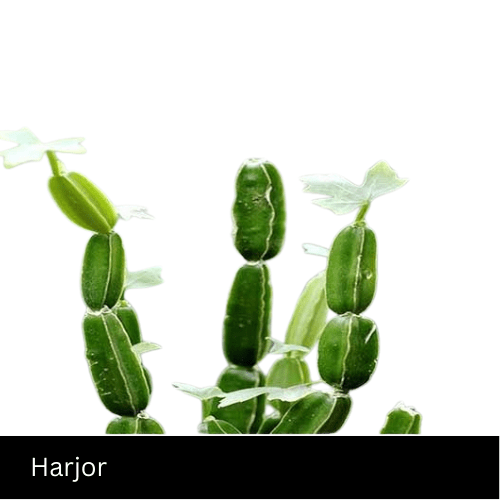About Harjor / Cissus Quadirangularis
In traditional medicine, Harjor has been used for its medicinal properties, particularly for treating bone fractures and joint problems. It is believed to have anti-inflammatory, analgesic, and bone-strengthening properties. The plant contains compounds such as testosterone, triterpenoids, and flavonoids, which are responsible for its therapeutic effects.
Some studies have suggested that Harjor extract may have beneficial effects on bone health, including increasing bone density and improving bone healing after fractures. It may also have anti-inflammatory effects that could be useful for treating conditions such as osteoarthritis.
However, more research is needed to fully understand the potential benefits and risks of using Harjor for medicinal purposes. As with any herbal supplement, it is important to consult with a healthcare provider before using it, particularly if you are pregnant, breastfeeding, have a medical condition, or are taking medication.
- Veld grape
- Devil’s backbone
- Hadjod
- Asthisamharaka
- Pirandai
- Adamant creeper
- Edible stemmed vine
- Winged treeline
- Haddi-Baddi
These are some of the common names for Harjor, but there may be other names used in different regions or languages.
-
May improve bone health: Harjor has been traditionally used to treat bone fractures and is believed to have bone-strengthening properties. Some studies suggest that Harjor extract may increase bone density and improve bone healing after fractures.
-
May have anti-inflammatory effects: Harjor contains compounds that have been shown to have anti-inflammatory effects, which may be useful for treating conditions such as osteoarthritis.
-
May reduce joint pain: Some studies suggest that Harjor may have analgesic properties and may help reduce joint pain and inflammation in people with osteoarthritis or other joint conditions.
-
May help lower blood glucose levels: Harjor has been shown to have hypoglycemic effects in animal studies, suggesting it may be useful for managing blood sugar levels.
-
May have antioxidant effects: Harjor contains antioxidants that may help protect against oxidative damage caused by free radicals.
-
May have anti-cancer properties: Some studies suggest that Harjor may have anti-cancer properties and may help inhibit the growth of cancer cells.
-
May have anti-ulcer properties: Harjor has been traditionally used to treat gastrointestinal disorders, and some studies suggest that it may have anti-ulcer properties.
-
May help reduce stress and anxiety: Some studies suggest that Harjor may have adaptogenic properties, which may help reduce stress and anxiety.
-
May improve cardiovascular health: Harjor may help improve cardiovascular health by reducing cholesterol levels and reducing oxidative stress.
-
May improve athletic performance: Harjor has been used in traditional medicine to improve athletic performance and reduce muscle soreness. Some studies suggest that it may help improve endurance and reduce exercise-induced inflammation and muscle damage.
It’s important to note that further research is needed to fully understand the potential benefits and risks of using Harjor for medicinal purposes. Always consult with a healthcare provider before using any herbal supplement.
There are different varieties of Cissus quadrangularis that are used for various purposes such as ornamental plants or for food, but the medicinal benefits are generally attributed to the species as a whole rather than specific varieties.
The taste of Harjor stems and leaves is described as slightly sour or acidic, with a crunchy texture. In some regions, it is used as a souring agent in soups, stews, and curries, and is sometimes pickled or preserved in vinegar. However, it should be noted that the medicinal benefits of Harjor are generally derived from supplements or extracts, rather than from consuming the plant directly.
-
Ketosterones: These are steroid compounds found in Harjor that have been shown to have anabolic effects, which may help improve muscle growth and athletic performance.
-
Flavonoids: Harjor contains several flavonoids, including quercetin and kaempferol, which have antioxidant and anti-inflammatory effects.
-
Triterpenoids: These are compounds found in Harjor that have been shown to have anti-inflammatory effects and may help reduce joint pain.
-
Calcium and other minerals: Harjor is a rich source of calcium, which is important for bone health. It also contains other minerals such as magnesium, potassium, and zinc.
-
Carotenoids: Harjor contains carotenoids, including β-carotene and lutein, which have antioxidant effects and may help protect against oxidative damage.
-
Phenolic compounds: Harjor contains various phenolic compounds, including resveratrol and piceatannol, which have antioxidant and anti-inflammatory effects.
-
Polysaccharides: Harjor contains polysaccharides, which have been shown to have immune-modulating effects and may help improve immune function.
These compounds are believed to contribute to the various health benefits associated with Harjor, although more research is needed to fully understand their effects on the body.

